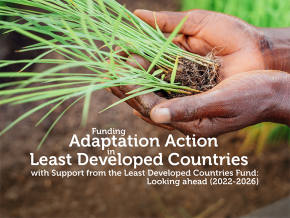
View of farm land in Barbados
On the island of Barbados there is an organic movement to reduce the use of agrochemicals for food production (synthetic fertilizers, pesticides and growth hormones) which impact negatively on the groundwater supply and nearshore marine environment. Customer surveys have shown that there is a high demand for organic produce among the tourists and local population in Barbados. However, the production of organic produce falls well below the demand for it. Organic food production makes up less than 10 percent of national food production. In 2004, the country adopted organic standards through the Barbados National Standards Institute (BNSI), based on the CODEX Alimentarius guidelines for organic farming, but had not developed the system for delivery of inspections and certification that would facilitate the enforcement of these standards. Consequently the major organic agricultural association in Barbados, the Organic Growers and Consumers Association (OGCA) had no tangible means to verify the practices of their growers as being of a standard that merits recognition. This challenge had been compounded by the lack of a credible, sufficiently independent entity responsible for conducting inspections and awarding organic certification to existing organic growers and farmers.
In 2014 OGCA received support from SGP to develop and implement a national organic inspection and certification system. The project primarily targeted members of the association by building their capacity to facilitate the certification process and to meet the requirements for organic certification.
OGCA sought to facilitate training of inspectors while educating farmers and developing monitoring and reporting systems for the certification process. OGCA collaborated with the Jamaica Organic Association Movement (JOAM) and the International Organic Inspectors Association (IOIA) in this effort. Key activities implemented by OGCA through this project included training and certification.
In particular, ten people were recruited and trained as inspectors to serve as trainers of future trainees. An additional 22 people were trained in data collection and farm record keeping using information technology and received assistance in project management. Among the project’s outputs, a short educational tutorial was produced, along with two organic and environmental training modules in computer readable format. The project resulted in the development of a centralized electronic farm monitoring system. Organic farm inspection reports were completed and submitted for ratification by the authorising agency. Overall public awareness was raised about the Codex guidelines and the OGCA certification logo was disseminated and promoted widely.
The project successfully trained members of the OGCA in sound organic farm management practices to avoid the use of synthetic fertilizers and pesticides in farming operations. Farmers were trained to document their day to day farming activities using android/tablet technology. Thirteen persons, ten of whom are local residents, were trained and are now part of a pool of certified organic inspectors recognized through IOIA to verify organic practices for either private or government certification bodies. Staff of the competent authorities, including the BNSI of the Ministry of Commerce and the Ministry of Agriculture have also benefited from training to assist in the authorization of organic farm certification.
The organic inspection training has reaped co-benefits for inspectors, organic producers and consumers. It has created new career opportunities and avenues for complementary livelihoods and income generation. Inspectors have the opportunity to either work with certification bodies or as consultants to organic farmers to ensure compliance of the standards for achieving organic certification status. In addition, an organic certification status will justify a premium price for organic produce which will be an incentive to some farmers, while simultaneously satisfying the confidence level of consumers in the purchase of genuine organically produced crops. The widespread adoption of organic farming will contribute to the avoidance and reduction of agrochemicals.
A multi-disciplinary, supportive and experienced Secretariat provides strategic guidance while facilitating the mobilization of financial and non-financial resources. The inclusion of capacity building initiatives can increase confidence and also willingness to better participate in project initiatives. The project demonstrates that a local non-governmental organization can advocate and influence the policy implementation of Codex Alimentarius standards and guidelines at the national, institutional, and community level through strategic partnerships, stakeholder engagement and education. By establishing a multi-disciplinary steering committee, OGCA created a participatory and inclusive environment for stakeholders involved in organic food production. There is now full support from government, technical and financial stakeholders to operationalise the organic certification process. Training of government officers in organic farm inspection, further enhanced the government’s commitment. A continuation of the strong partnership established between OGCA and the Ministry of Agriculture will be required to strengthen the legislation and increase resource mobilization efforts. In recognition of its advocacy efforts, OGCA was identified as a key stakeholder to contribute to the revision of the National Physical Development Plan of Barbados.
The cost of organic farm inspection has traditionally been a major impediment for farmers in their quest to obtain farm certification. The cadre of local organic inspectors created by the project facilitates sustainability by reducing the need to acquire the services of external inspectors that would normally be sourced from Europe or United States of America at a much higher cost. The relationships with key authorities, including BNSI and the Ministry of Agriculture, have been enhanced and subsequent ownership of these initiatives by these entities has enhanced the sustainability of this initiative by providing a conduit for the implementation of the certification system beyond the lifetime of the project. The project has been widely publicized and consumers are becoming more aware of the standards for organic food production. The establishment of an organic brand has allowed for organic product differentiation within the market and is expected to lead to increased demand for organic produce.
The project learned that peer to peer knowledge is very important but must be guided by the project’s objectives and adapted or contextualised based on the environment in which it is being applied. There have been a few barriers encountered to successful knowledge exchange rooted in the belief that someone else will reap the benefits that the initiator was unable to obtain. However efforts to address these have included increasing transparency, giving credit to individuals involved in the process, ensuring a participatory strategy while creating a model organization with benefit sharing for all members. The creation of online communities for committee members and OGCA members have facilitated knowledge sharing and also kept up the momentum by enabling access to virtual and remote knowledge exchange possibilities.
This story was originally published in "Community-Based Chemicals and Waste Management" in 2016.


